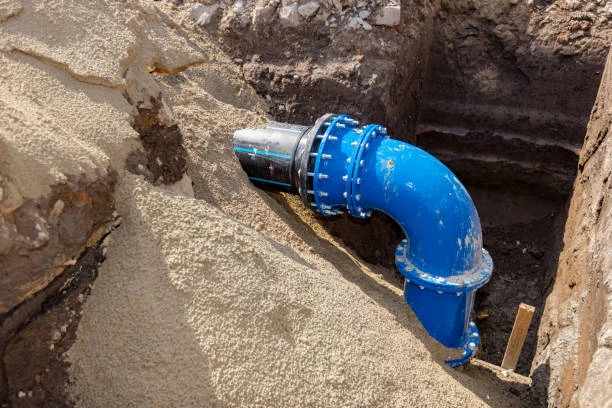Introduction
Water Pipe In Richmond, Virginia, the Department of Public Utilities (DPU) is urging residents to take proactive steps in ensuring their drinking water is safe from lead contamination. Lead in drinking water is a significant public health concern, particularly in older homes with aging water pipes. This article will explore the importance of testing water pipes for lead, the health risks associated with lead exposure, and the steps residents can take to protect themselves and their families.
The Importance of Water Pipe
Water pipes are the essential infrastructure that delivers clean and safe drinking water to homes and businesses. However, the materials used in these pipes, particularly in older systems, can pose health risks. Lead pipes, which were commonly used in plumbing until the late 1980s, can leach lead into the water supply, especially when the water is acidic or has low mineral content. Understanding the importance of water pipes and the potential risks associated with them is crucial for maintaining public health.
Public Health Water Pipe Implications
- Lead Exposure Risks: Lead is a toxic metal that can cause severe health problems, particularly in children and pregnant women. Exposure to lead can affect brain development, leading to learning disabilities and behavioral issues. In adults, lead exposure can result in high blood pressure, kidney damage, and reproductive issues.
- Aging Infrastructure: Many cities, including Richmond, have aging water infrastructure that may still contain lead pipes. As these pipes deteriorate, the risk of lead contamination increases. Regular testing and maintenance are essential to ensure the safety of drinking water.
- Economic Consequences: The presence of lead in drinking water can have economic implications for communities. Health issues related to lead exposure can result in increased healthcare costs and lost productivity, affecting the local economy.
The Urgency of Testing Water Pipe
The Richmond DPU is emphasizing the importance of testing water pipes for lead contamination. Here are some key reasons why residents should take this issue seriously:
1. Health Water Pipe Protection
Testing water pipes for lead is a critical step in protecting the health of residents. By identifying and addressing lead contamination, families can reduce their risk of exposure and its associated health risks.
2. Community Awareness
Raising awareness about lead contamination encourages community engagement. When residents understand the risks and take action, it creates a collective effort to improve public health and safety.
3. Compliance with Regulations
Testing water pipes for lead is essential for compliance with federal and state regulations. The Environmental Protection Agency (EPA) has established guidelines for lead and copper rule compliance, which require public water systems to monitor lead levels and take action when necessary.
4. Peace of Mind
Knowing the lead levels in their drinking water can provide residents with peace of mind. If tests reveal safe levels of lead, families can feel confident in their water supply. Conversely, if lead is detected, residents can take appropriate measures to mitigate exposure.
How to Test Water Pipe for Lead
Residents can take several steps to test their water pipes for lead contamination:
1. Contact the DPU
The Richmond DPU offers resources and support for residents looking to test their water for lead. Residents can contact the DPU to request testing kits or information on how to conduct their tests.
2. Use a Lead Testing Kit
Lead testing kits are available for purchase at hardware stores or online. These kits typically include instructions on how to collect water samples and send them to a laboratory for analysis. Residents should follow the instructions carefully to ensure accurate results.
3. Identify Lead Pipes
Residents should inspect their plumbing for lead pipes. Lead pipes are typically dull gray and can be scratched with a key, revealing a shiny surface underneath. If residents are unsure, they can consult a plumber or contact the DPU for assistance.
4. Flush the Pipes
Before taking a water sample, residents should flush their pipes by running cold water for at least 5 minutes. This helps to ensure that the sample reflects the water that would be consumed rather than water that has been sitting in the pipes.
5. Send Samples for Testing
Once the water sample is collected, residents should send it to a certified laboratory for testing. The laboratory will analyze the sample for lead levels and provide results.
What to Do If Lead Is Water Pipe Detected
If lead is detected in the water supply, residents should take immediate action to reduce exposure

1. Use Filters
Installing a water filter certified to remove lead can help reduce lead levels in drinking water. Residents should ensure that the filter is properly maintained and replaced according to the manufacturer’s instructions.
2. Use Alternative Water Pipe Sources
For cooking and drinking, residents should consider using bottled water or water from a safe source until the lead issue is resolved.
3. Replace Lead Pipes
If lead pipes are identified in the home, residents should consider replacing them with safer materials, such as copper or PVC. This is a significant investment but is crucial for long-term health and safety.
4. Stay Informed
Residents should stay informed about local water quality and any updates from the Richmond DPU. Regular communication from local authorities can provide valuable information on water safety and testing initiatives.
Conclusion
The Richmond DPU’s campaign to urge residents to test their water pipes for lead is a crucial step in safeguarding public health. By understanding the risks associated with lead exposure and taking proactive measures to test and address potential contamination, residents can help ensure a safe and reliable water supply for themselves and their families. Community awareness and action are vital in creating a healthier environment for all.
FAQs
- How do I know if my home has lead pipes?
Lead pipes are usually dull gray and can be scratched to reveal a shiny surface. If you are unsure, consult a plumber or contact the Richmond DPU for assistance. - What should I do if my water tests positive for lead?
If lead is detected, consider using a certified water filter, using bottled water for drinking and cooking, and replacing lead pipes with safer materials. - How can I get a water testing kit?
You can contact the Richmond DPU for information on obtaining a lead testing kit or purchase one at a local hardware store or online. - What are the health risks associated with lead exposure?
Lead exposure can cause serious health problems, especially in children, including developmental delays, learning disabilities, and behavioral issues. In adults, it can lead to high blood pressure and kidney damage. - How often should I test my water for lead?
It is recommended to test your water for lead every few years, especially if you live in an older home or if there have been changes in your water supply or plumbing.


















